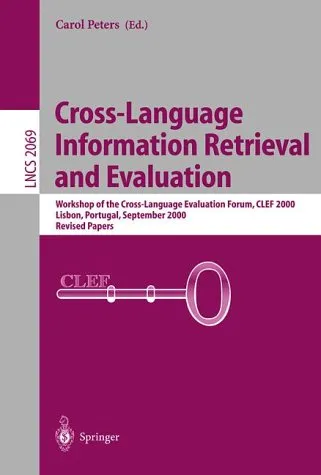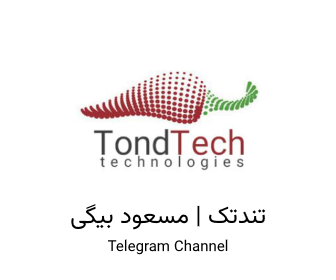Cross-Language Information Retrieval and Evaluation: Workshop of the Cross-Language Evaluation Forum, CLEF 2000 Lisbon, Portugal, September 21–22, 2000 Revised Papers
4.0
بر اساس نظر کاربران

شما میتونید سوالاتتون در باره کتاب رو از هوش مصنوعیش بعد از ورود بپرسید
هر دانلود یا پرسش از هوش مصنوعی 2 امتیاز لازم دارد، برای بدست آوردن امتیاز رایگان، به صفحه ی راهنمای امتیازات سر بزنید و یک سری کار ارزشمند انجام بدینمعرفی کتاب
کتاب "Cross-Language Information Retrieval and Evaluation" اثر Carol Peters به موضوع مهم و کمتر شناختهشدهای در حوزه Cross-Language Information Retrieval (CLIR) میپردازد. این کتاب مجموعهای از مقالات بازبینیشده از کارگاه CLEF 2000 است که در لیسبون، پرتغال برگزار شد. این کارگاه و محتوای ارائه شده در این کتاب نقطه عطفی در پیشرفت مفاهیم و ارزیابی سیستمهای بازیابی اطلاعات میانزبانی بوده و درک جدیدی از نقش زبان در فناوری اطلاعات ارائه میدهد.
هدف اصلی این کتاب نهتنها ارائه بهترین روشها و دستاوردها در زمینه بازیابی اطلاعات میانزبانی است، بلکه ایجاد بستری برای همفکری و تحقیقاتی نوآورانه برای پژوهشگران و متخصصان از سراسر جهان میباشد.
خلاصهای جامع از کتاب
این کتاب ساختاری منظم و منطقی دارد که خوانندگان را از اصول اولیه گرفته تا موضوعات پیشرفته در حوزه CLIR همراهی میکند. در این کتاب، تمرکز روی مفاهیمی همچون query translation، document retrieval و cross-lingual corpus analysis است. بخشهای مختلفی از کتاب به چالشهای اصلی در پردازش زبانهای مختلف، تفاوتهای فرهنگی و همچنین مشکلات ناشی از تفاوتهای ساختاری زبانها میپردازد.
هر مقالهای که در این کتاب گنجانده شده است، بازتابدهنده یک رویکرد منحصر به فرد یا نتیجه آزمایشات دقیق در یک جنبه از سیستمهای CLIR است. به طور خاص، موضوعاتی نظیر بهترین استراتژیهای ترجمه ماشینی برای جستجوهای چندزبانه، روشهای ارزیابی استاندارد برای سیستمهای اطلاعاتی، و همچنین اهمیت ایندیسی (indexing) چندزبانه مورد بحث قرار گرفتهاند.
علاوه بر این، کتاب به نیاز افزایش همکاری بینالمللی در حوزه تحقیقاتی اشاره میکند و چارچوبهای استاندارد تازهای برای ارزیابی سیستمها پیشنهاد میدهد که به ارتقای کیفیت نتایج تحقیق کمک میکند.
نکات کلیدی
- تعریف و اهمیت Cross-Language Information Retrieval (CLIR)
- بررسی چالشهای زبانی و فرهنگی در سیستمهای CLIR
- آشنایی با روشهای پیشرفته برای query translation
- اهمیت استانداردسازی و ارزیابی دقیق در بهبود سیستمهای بازیابی میانزبانی
- نقش جامعه جهانی تحقیقاتی در توسعه ابزارهای بازیابی اطلاعات
جملات معروف از کتاب
"The success of cross-language information retrieval depends not only on linguistic precision but also on understanding the cultural and contextual nuances of language."
"Standardized evaluation frameworks are the cornerstone of progress in CLIR systems."
چرا این کتاب مهم است؟
این کتاب یکی از منابع برجسته و پیشرو در حوزه CLIR است و به دلیل داشتن محتوای جامع و کاربردی اهمیت ویژهای دارد. جامعه پژوهشی میتواند از راهبردها و یافتههای این کتاب به عنوان پایهای برای توسعه سیستمهای کارآمدتر استفاده کند. همچنین، ارائه روشهای استاندارد ارزیابی در این کتاب باعث شده که به یکی از منابع مرجع برای پژوهشگران و متخصصان حوزه Information Retrieval تبدیل شود.
موضوعات مطرح شده در این کتاب توانستهاند راه را برای تحقیقاتی گستردهتر و بینالمللی هموار کنند. به علاوه، اهمیت کارگاه CLEF به عنوان بستری برای ارتقای همکاریهای پژوهشی، دلیلی دیگر برای اهمیت این کتاب است.
Introduction to the Book
Welcome to Cross-Language Information Retrieval and Evaluation: Workshop of the Cross-Language Evaluation Forum, CLEF 2000, an insightful exploration of the advancements and research conducted in the dynamic field of cross-language information retrieval (CLIR). This book consolidates the revised and peer-reviewed papers presented during the CLEF 2000 Workshop, held in Lisbon, Portugal. These contributions reflect the collaborative efforts of leading experts in the field, aiming to surmount the linguistic and cultural barriers that often hinder effective information retrieval across different languages.
The book addresses the complexities inherent in multilingual information retrieval, focusing on strategies, systems, and evaluations that optimize access to diverse and multilingual resources. This compilation serves as both a technical roadmap and an inspiration for researchers, practitioners, and students tackling the challenges of cross-language information access in a globalized digital era.
Detailed Summary of the Book
At its core, this book provides a comprehensive overview of the methodologies, systems, and evaluation frameworks developed to harness the potential of CLIR technologies. The contributions are grouped under key thematic areas:
- The design and performance of cross-language information retrieval systems.
- Evaluation of multilingual retrieval systems through systematic experiments.
- Techniques for analyzing and improving user interaction with multilingual queries and interfaces.
The CLEF 2000 Workshop was pivotal in driving forward research and establishing benchmarks in this specialized field. This book captures the lively discussions, results, and breakthroughs shared during the workshop, providing readers with a panoramic view of the state-of-the-art in CLIR at the time. Each chapter has been meticulously revised to include follow-up results, making it not only a historical document but also a relevant resource for those still expanding upon these foundational ideas.
Key Takeaways
1. Cross-Language Information Retrieval is essential for global information access. The book underscores the importance of bridging the language gap in order to create a truly interconnected world where users can search and retrieve information in languages other than their own.
2. System design and evaluation matter. Building robust, scalable, and efficient retrieval systems is only one side of the coin; equally critical is their evaluation through standardized testing frameworks such as CLEF.
3. Multidisciplinary collaboration is key. The workshop and this book reflect the necessity of combining linguistics, computer science, human-computer interaction, and evaluation methodologies to propel the field of CLIR forward.
4. User context and interaction. Understanding how users formulate their queries and interact with retrieval systems plays a crucial role in improving the performance and usability of CLIR tools.
Famous Quotes from the Book
"The challenge of cross-language information retrieval is not merely technical but deeply rooted in the diverse ways human languages convey meaning and context."
"As information becomes ever more global, so must our ability to access, retrieve, and understand it—no matter what language it is presented in."
"A well-evaluated system is the cornerstone of innovation in information retrieval."
Why This Book Matters
The importance of Cross-Language Information Retrieval and Evaluation lies in its timely response to the burgeoning demand for better multilingual access to information. The book stands as a testament to the pioneering efforts of researchers and technologists who saw the pressing need to create tools and frameworks capable of breaking through the "language barrier" in information retrieval.
Today, in a world where digital content is produced in thousands of languages, the principles and strategies outlined in this work remain as relevant as ever. It continues to inspire advancements in machine translation, natural language processing, and search technologies. Furthermore, it provides a solid foundation for researchers, educators, and policymakers interested in fostering inclusive and equitable access to information across linguistic divides.
Ultimately, this book is not just for those within the CLIR field but also for anyone passionate about leveraging technology to create a more connected and informed world. Its legacy lies in its role as a key stepping stone in the evolution of multilingual information retrieval systems.
دانلود رایگان مستقیم
برای دانلود رایگان این کتاب و هزاران کتاب دیگه همین حالا عضو بشین
برای خواندن این کتاب باید نرم افزار PDF Reader را دانلود کنید Foxit Reader


